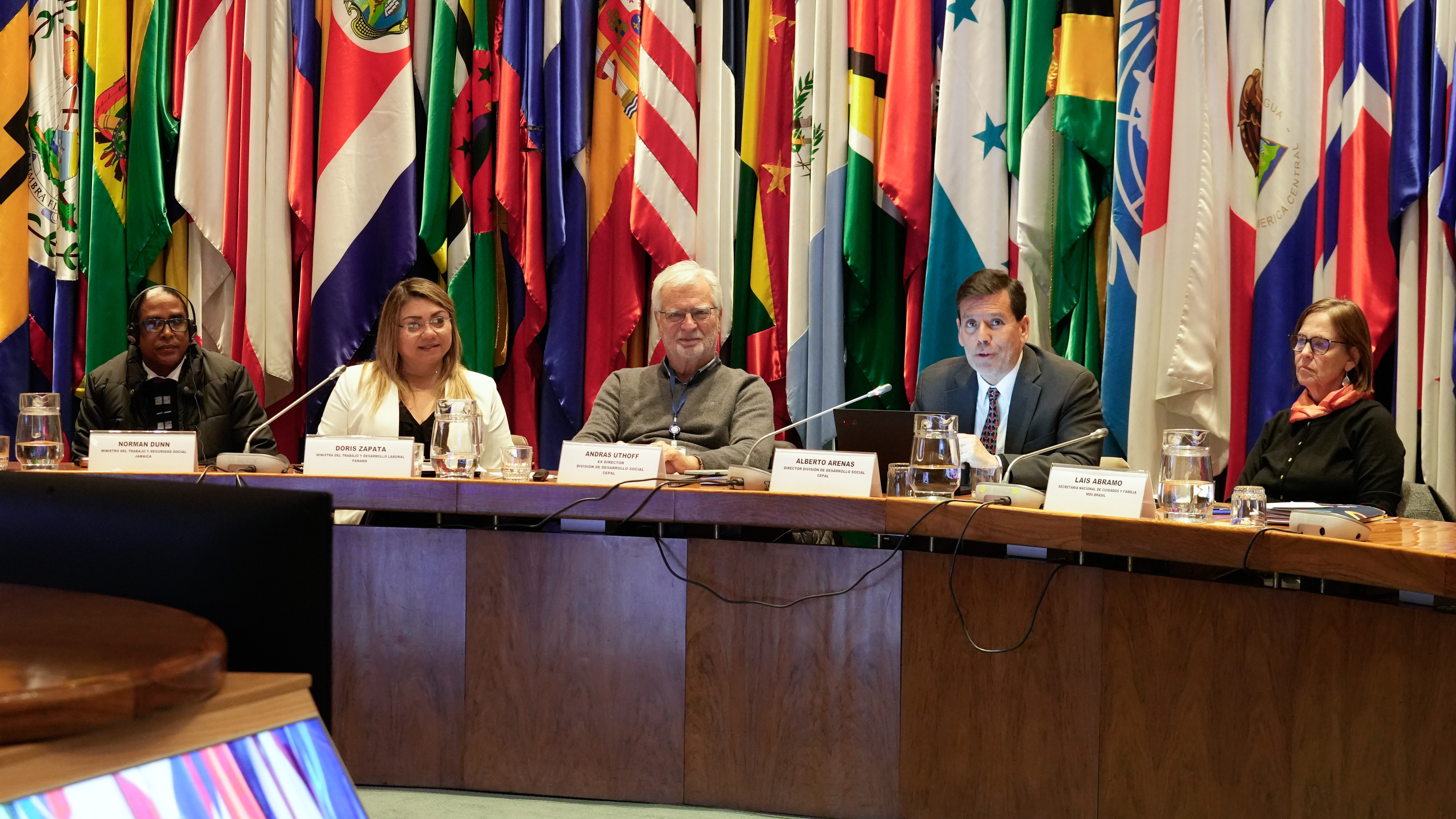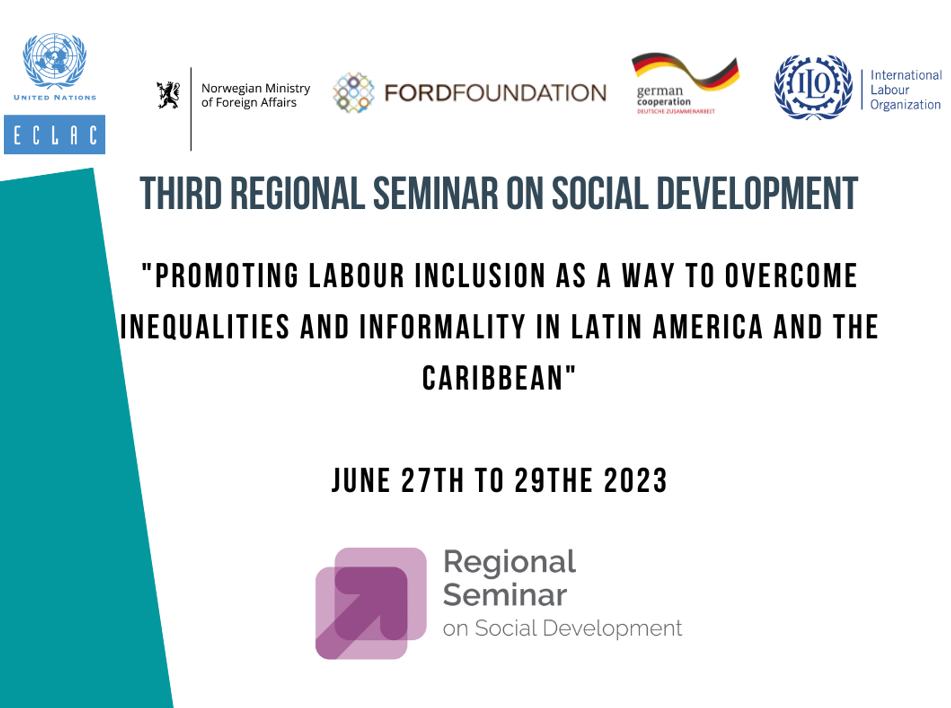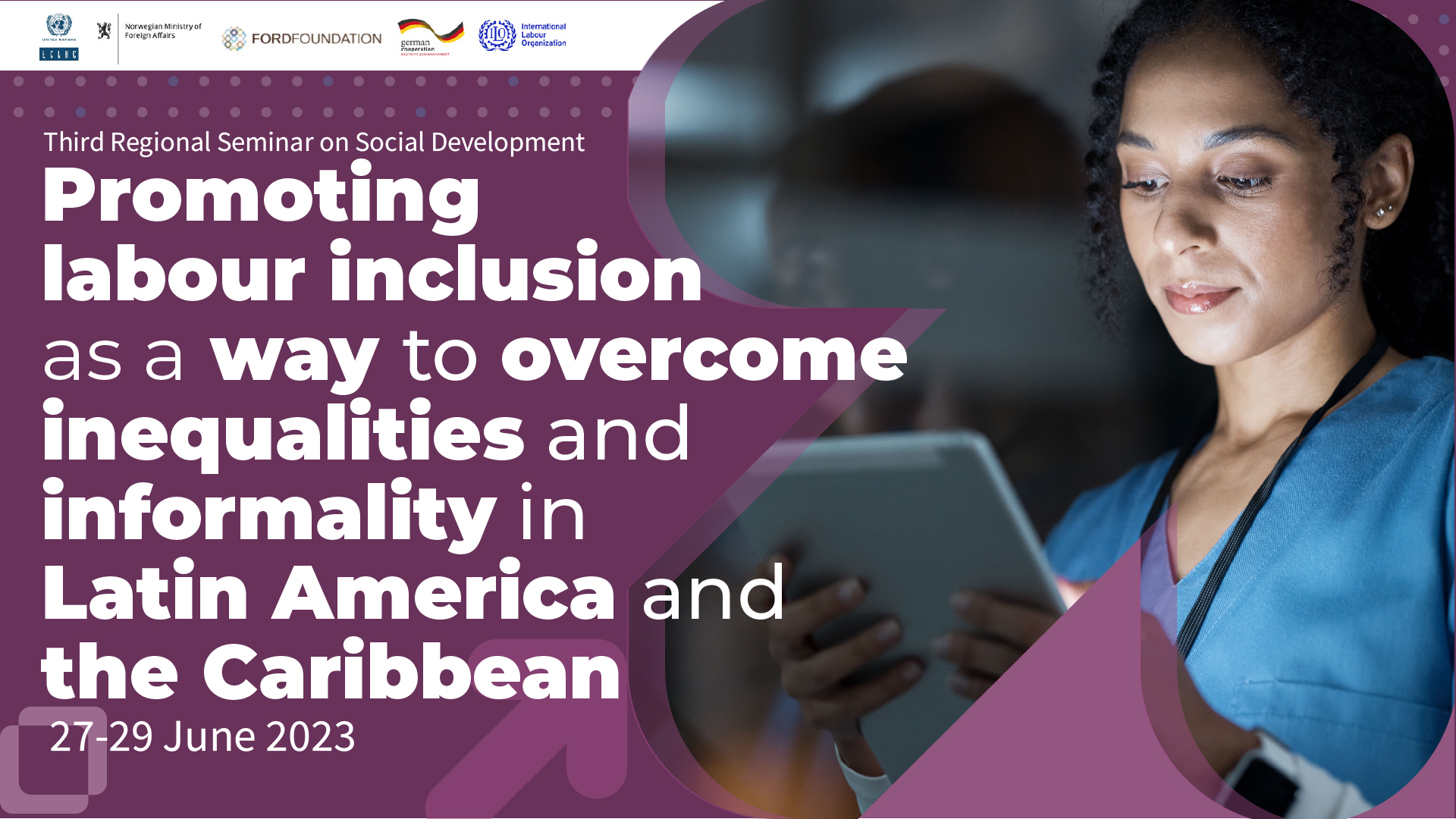ECLAC: Latin America and the Caribbean Faces the Challenge of Moving from Labour Market Participation to Labour Inclusion
Work area(s)
Today the Third Regional Seminar on Social Development concluded, having convened Labour Ministers, academics, specialists and representatives of trade-union and employer organizations.

Labour inclusion policies in the region must have a strategic and comprehensive perspective that also involves educational, productive, fiscal, social and environmental spheres, among others, according to participants in the Third Regional Seminar on Social Development: Promoting labour inclusion as a way to overcome inequalities and informality in Latin America and the Caribbean, held on June 27-29, 2023 at ECLAC’s central headquarters in Santiago, Chile.
“It will not be possible to create a better future for work without creating a better future for production, and vice versa. They are two sides of the same coin,” José Manuel Salazar-Xirinachs, Executive Secretary of the Economic Commission for Latin America and the Caribbean (ECLAC), indicated in this regard at the opening session of the event, held using a hybrid format and organized in collaboration with the International Labour Organization (ILO), the Norwegian Ministry of Foreign Affairs, German Cooperation and the Ford Foundation.
Labour inclusion consists of two successive and complementary phases: labour market participation and the specific working conditions attained, participants explained during the seminar that brought together government representatives from 22 countries in Latin America and the Caribbean, including 10 Labour Ministers, and drew an average of 800 people connecting online each day.
“The challenge in the region is to move from labour market participation to labour inclusion,” declared the Director of ECLAC’s Social Development Division, Alberto Arenas de Mesa.
According to the latest statistics from ECLAC and the ILO, the unemployment rate in Latin America and the Caribbean was 7% in 2022. That means that 93% of the regional workforce is participating in the labour market. “The problem is that 50% of employed persons work informally, 40% receive pay that is below the minimum wage and 1 out of every 5 is living in poverty,” Arenas de Mesa stated.
Labour inclusion policies tackle and reduce informality and inequality and, therefore, must be at the center of strategies for inclusive and sustainable social development in the region, said the senior official, who participated in the event’s closing discussion with former Directors of the Social Development Division, including Andras Uthoff, Martín Hopenhayn (virtual) and Laís Abramo.
Labour markets are undergoing a slow-motion crisis in the region, Arenas de Mesa sustained.
According to ECLAC’s data, the COVID-19 pandemic unleashed the biggest crisis that Latin America and the Caribbean’s labour markets had experienced since 1950.
In 2020, job creation fell by 8.2%, marking the only decline recorded in the previous 70 years, and between 2014 and 2023, the growth rate in the number of employed persons will be just 1.26%, compared with 3.2% in the “lost decade” of the 1980s.
In addition, numerous entry barriers to the labour market continue to exist: one out of every two women remains outside the labour market; youth labour participation is substantially lower than that of adults; and the labour participation of indigenous women is considerably lower than that of men and that of non-indigenous women, to mention a few examples.
This compounds the fact that labour markets are going through a period of great uncertainty, the event’s speakers emphasized, since technological changes are creating a dynamic of job transformation, destruction and creation.
According to ECLAC’s data, 28.4% of jobs in the region are at a high risk of automation.
It is further estimated that 31.3% of workers are underqualified for the tasks they perform. This skills mismatch threatens to worsen in the context of the future of work.
In these circumstances, Labour Ministries are central to implementing and articulating labour inclusion policies, which means that fortifying public, labour-related institutions in the region’s countries is a priority.
According to ECLAC, Labour Ministries’ foresight capacities must be strengthened (to anticipate future scenarios), along with their capacities for strategic planning; dialogue, leadership and negotiation; management (to articulate distinct sectors and levels of government and to efficiently allocate available resources); and evaluation and accountability.
Nonetheless, Arenas de Mesa noted, governments in Latin America and the Caribbean spend approximately 0.4% of Gross Domestic Product (GDP) on labour policies. To ensure the sustainability of labour inclusion policies, a broad and cross-cutting social compact is needed, he concluded.
During the three-day seminar – which included six thematic panels, a discussion panel and keynote addresses by globally renowned specialists – participants explored in depth issues such as labour informality, child labour, youth labour inclusion, the present and future of work, skills development for labour inclusion, and the articulation of labour policies and social protection.
Related content

Labour Inclusion is a Critical Factor for Reducing Inequality and Informality in Latin America and the Caribbean
Today authorities and specialists inaugurated the Third Regional Seminar on Social Development, organized by ECLAC in collaboration with numerous institutions.

Third Regional Seminar on Social Development "Promoting labour inclusion as a way to overcome inequalities and informality in Latin America and the Caribbean"
The objective of this third Regional Seminar on Social Development, which will be held in a hybrid format, is to reflect on the promotion of labour inclusion policies that allow progress towards the…

Labour Inclusion Will Be the Main Theme of the Third Regional Seminar on Social Development, Organized by ECLAC
The event will take place on June 27-29 at the United Nations regional organization’s headquarters in Santiago, Chile.
Type
Country(ies)
- Latin America and the Caribbean
Contact
Public Information Unit
- prensa@cepal.org
- (56 2) 2210 2040

